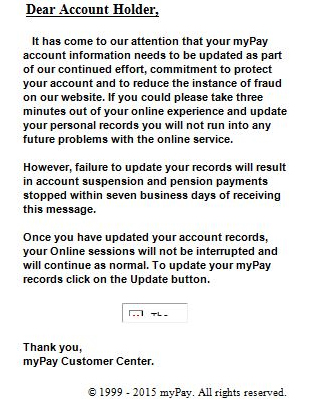By Spencer Brooks, Member Service Representative
Recently MOAA’s became aware of the fact that there are email scams targeting military service members, retirees, and their families going around claiming to be from the Defense and Finance Accounting Service (DFAS).
The emails mimic some scams in the past where emails appear to come from a “DFAS employee” and asked for documents containing personal information. The most recent scam looks like a legitimate “SmartDoc” email with the subject line “myPay IMPORTANT SECURITY UPDATE,” and the links provided in the emails take you to a malicious website that requests personal information. The messages even appear to come from a DFAS-SmartDocs email address, but this is a technique called “spoofing” that scams like this tend to use. One of MOAA’s former staff members provided an example of the email they received recently:

In a recent statement issued by DFAS they caution users that,
“Valid SmartDocs messages from DFAS are always sent in plain text, do not include attachments and do not ask you to send any information in response. Your email program may automatically convert a valid SmartDocs message into HTML and convert some text into clickable links. We recommend that you do NOT click on any links within any email message. To access a site referenced in an email, open your browser and type the link (URL) directly into the browser. Don’t get fooled. If you receive a SmartDocs message that contains a link, don’t click on it. If a URL is listed in the message type it in manually within your browser. Delete unexpected or unsolicited messages that contain attachments or that request you to send information back.”
In our current time where online scams and cyber-attacks are so prevalent, MOAA members should constantly be on alert for emails like this. Links that ask users to go to a website and submit personal information should always be taken as suspect. When asked to follow a link, the advice DFAS provides is the best way to avoid getting scammed, enter the URL manually into your browser to verify you are going to a trusted website. While it may seem cumbersome to constantly be on guard about these issues, taking a few basic steps can protect yourself and your family from scam artists.
You can read the DFAS online protection guidelines at the following link: http://www.dfas.mil/pressroom/onlineprotection.html
